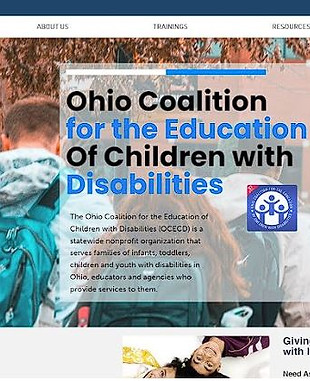Charting the LifeCourse
Charting the LifeCourse (CtLC) helps individuals and families of all abilities and ages develop a vision for a good life. What do you need to know and do? How can you find or develop supports? What does it take to live the life you want? CtLC helps individuals and families think through these questions, and the framework is the foundation for supporting a community of learning that champions transformational change through knowledge exchange, capacity building, and collaborative engagement.
Overview
Person Centered
Domains
Star
Trajectory

Agency Resources
Connect with dedicated agencies ready to assist you.
Agency Resources

Additional Resources
Take your knowledge to the next level. Elevate your learning journey today.
Additional Resources

Top 10 Topics: Parents Concerns and Matching Resources
his PACER Action Sheet provides a selection of helpful information to address each topic from a variety of national and statewide organizations. As Albert Einstein said, “Know where to find the information and how to use it — that's the secret of success.”

Development of the IEP
Development of the IEP When developing your child’s IEP, the team must consider five areas:
-
Your child’s strengths
-
Your concerns regarding your child’s education
-
The results of the most recent evaluation
-
Academic, developmental, and functional
-
needs Special factors

Parent Mentor Special Education Resources
For nearly 30 years, Ohio Parent Mentors has helped families navigate local and state special education processes and services so that children with disabilities can get the most out of their educational experience. Using our lived experience and an evidence-based approach, we work in collaboration with families, schools, and agencies to create the conditions for success for your child.

Nisonger
Nisonger The Ohio State University Nisonger Center has been in existence since 1966, among the first group of federally-funded University Centers for Excellence in Developmental Disabilities (UCEDD). The Nisonger Center enjoys an enviable reputation for its interdisciplinary research, education / training, clinical services and dissemination activities.

CADRE
This searchable library contains an extensive collection of publications, training materials, rich media, and tips for dispute resolution in special education produced by CADRE, Parent Centers, State and Lead Agencies, and other professionals.

Family Engagement Center
RESOURCES FOR FAMILIES
Welcome to our families hub, where we share research-based resources and tools to help launch students to success! You can find resources on a variety of topics for each grade level to support your child and you as a parent or caregiver, while also helping you, your school, and your community work together better.

Questions often asked by Parents about Special Education Services
When children are struggling in school, it’s important to find out why. It may be that a disability is affecting your child’s educational performance. If so, your child may be eligible for special education and related services that can help.
10 Basic Steps in Special Education
This searchable library contains an extensive collection of publications, training materials, rich media, and tips for dispute resolution in special education produced by CADRE, Parent Centers, State and Lead Agencies, and other professionals.

Autism Society
The Autism Society relies upon the tremendous work of our local organizations to help individuals and families throughout Ohio. Each affiliate serves its territory by offering information and referrals, creating programming, advocating for change, and generally improving the quality of life for those living with autism in that region.
Secondary Transition
Roadmap
Describe your service here. What makes it great? Use short catchy text to tell people what you offer, and the benefits they will receive. A great description gets readers in the mood, and makes them more likely to go ahead and book.
Dispute Resolution
Describe your service here. What makes it great? Use short catchy text to tell people what you offer, and the benefits they will receive. A great description gets readers in the mood, and makes them more likely to go ahead and book.
OCECD Publications
Describe your service here. What makes it great? Use short catchy text to tell people what you offer, and the benefits they will receive. A great description gets readers in the mood, and makes them more likely to go ahead and book.
OCECD for
Parents Resources
Describe your service here. What makes it great? Use short catchy text to tell people what you offer, and the benefits they will receive. A great description gets readers in the mood, and makes them more likely to go ahead and book.
Evaluation Roadmap
FOR FAMILIES WITH CHILDREN AGES 3 - 21 more

Ohio Early Intervention
Early Intervention (EI) works with families with children birth to age 3 who have developmental delays or disabilities so that they have the best possible start in life. EI professionals work with you and your child to identify strengths and needs and address concerns as early as possible with services right where you live, play, and spend your day.

You and Your Family
New to the system? Your local county board of developmental disabilities is the place to start for determining eligibility, assessing your needs, and coordinating which services can best support you.

For Families
Caregivers are essential to a child's healthy growth and development. Whether you are looking for child care options, parenting tips, or resources for a healthy pregnancy, this page offers families of all shapes and sizes with resources to meet their needs.

Infant Hearing Program
The Infant Hearing Program assists families of babies who do not pass a newborn hearing screening to complete a diagnostic audiological evaluation and provides a referral for early intervention services if hearing loss/deafness is found. Follow up coordination is provided by our program so that babies have the best start in life.

Project Stir
Project STIR™ is advocacy/leadership training designed to provide people with disabilities and their allies with the tools to advocate for themselves, work with others in advocacy and gain leadership experiences.

Early intervention program - procedural safeguards.
This rule sets forth the procedural safeguards in the early intervention program, including the provisions of parental consent and notice; retention, confidentiality, access to, and amendment of records; and dispute resolution.

Early Childhood, Children,
and Youth
Early childhood mental health is the social, emotional and behavioral well-being of children birth through six years and their families.
.png)
Special Education
Legal Clinic
This is not an endorsement of this, or any, law firm
The Special Education Legal Clinic offers parents and guardians an opportunity to meet with a special education advocate or attorney in an open and welcoming environment to ask questions and discuss specific challenges related to education. Clinic staff members and volunteers will help guide parents and guardians through the special education process and provide resources to request and secure special education services.

SPECIAL EDUCATION: EARLY INTERVENTION SERVICES & PAYMENT FOR SERVICES
The purpose of these services is to enhance the development of infants and toddlers with disabilities and to minimize the potential for developmental delay. The services are provided through a coordinated network of providers, driven by the needs of the family and documented through an Individualized Family Service Plan (IFSP). Not all services available through Early Intervention are free to families.

A FAMILY'S GUIDE TO ENGAGEMENT
Parents who take an active role in creating their child’s plan for services and supports will feel included and be better prepared to advocate for their child’s needs. This guide will give parents the tools they need to understand how to engage with teams to be an effective advocate for their child.
.png)
Development of the Transition
Plan in Part C
As toddlers receiving early intervention services approach their third birthday, it’s time to start planning ahead for when they (and their families) leave the Part C system and move on to either Part B services or other appropriate programs or services.

Focus on School Age
School age is the years from kindergarten through middle school. For Now that your child is school age, he or she will likely spend a lot of time with people other than their parents or family. During this life stage, your child is growing and changing rapidly, and they need many opportunities to have life experiences that will help them learn and excel at home, at school, and in the community, as they move toward becoming young adults.

Focus on TRANSITION TO ADULTHOOD
Transition means that you are moving from childhood to young adulthood and from school to adult life. There are many things to think about and do to prepare for this change. Transition is a point in time filled with change, growth, excitement, and sometimes fear and confusion.

Focus on ADULTHOOD
Adulthood is the period from the time after we transition from school and childhood years through the time when we enter our golden years. For most of us, adulthood is the longest stage of life. Even though the school years have ended, you can continue to learn and grow throughout your adult life.
The Ohio Special Education Response Team Meeting Process
The purpose of the Ohio Special Education Response Team (OSERT) is to provide a forum to get advice and recommendations on complex cases where support professionals may be stuck in their advocacy and need ideas to move the case forward. Each month staff from Disability Rights Ohio (DRO), the Ohio Coalition for the Education of Children with Disabilities (OCECD), and University of Cincinnati Center for Excellence in Developmental Disabilities (UCCEDD) will provide feedback for family support specialists and other family support and advocacy professionals. Meetings will take place via zoom on the 4th Wednesday of every month beginning February 23rd, 2022 from 12:00pm-1:00pm
Tip Sheets















